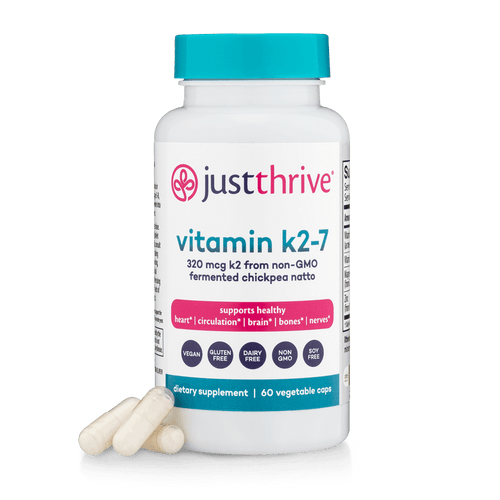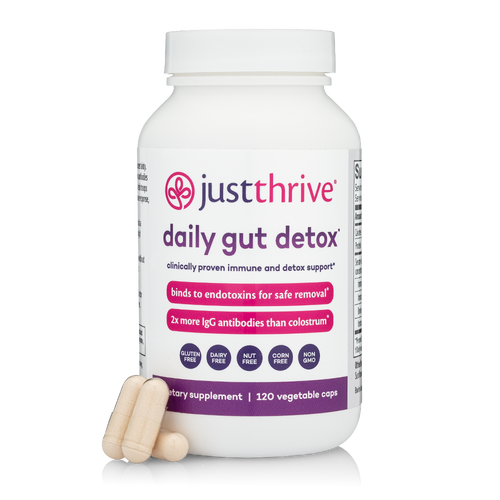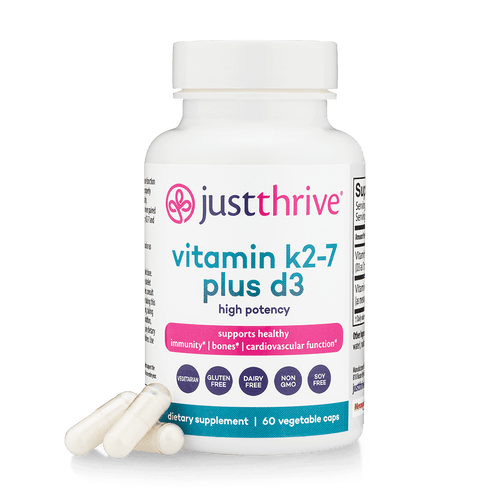5 Reasons Your Vitamin D Levels Are Dropping
Does it seem like you’re catching everything that’s floating around? Do you feel down… exhausted… or stressed?
All of these issues can trace back to a single source: you’re not getting enough vitamin D.
That’s true even if you spend a lot of time outside, soaking up the sunshine vitamin. No matter how much sun exposure you’re getting, chances are that your D levels are still running low. And it’s not just you.
Vitamin D deficiency is frighteningly common all around the world. It’s one of the most alarming global public health issues, affecting nearly a billion people. On top of that, around 50% of people worldwide have low vitamin D levels. In the U.S. alone, 35% of adults are vitamin D deficient.[1]
That means you can’t just count on the sun to fill up your vitamin D tank. You have to take proactive steps to make sure you’re getting enough of this essential nutrient… or your health could suffer serious consequences.
What Happens When You’re Down in D
Vitamin D is essential for life, which is why nature made the sun our richest source. But the way we live now interferes with that, making it nearly impossible for anyone to get enough of that nutrient from sunshine alone. And when you factor in all of the other D detractors that we’ll go over in a moment, it’s no wonder so many people are deficient.
Vitamin D is crucial for your overall wellness, and that includes optimal immune function. And when your levels are running low, even a little low, it will take a toll on your health.

Although vitamin D is most closely linked with strong bones, it affects so much more than that. Scientists are learning more all the time about how vital vitamin D is for survival, longevity, and vitality. Studies show that low vitamin D can lead to a wide range of diseases including:
- Several types of cancer including prostate, colorectal, and breast cancers as well as multiple myeloma[2]
- >Rheumatoid arthritis[3]
- Pneumonia[4]
- Respiratory infections[5]
- Inflammatory bowel disease (IBD)[6]
- Diabetes[7]
- Heart disease[8]
- Depression[9]
- Fatigue[10]
5 Reasons Your Vitamin D Is Declining
You may be wondering how you can possibly be low in vitamin D when you love being outdoors. That’s one big piece of the D puzzle, and it’s probably not working the way you think it is. There are concrete reasons you’re dancing with insufficient or even deficient vitamin D levels…
1. You’re Getting Less Sun Than You Think.
Yes, you’re outside a lot. But you need to have 40% of your skin exposed to direct sun for at least 20 minutes every day to ward off vitamin D deficiency.[11] And you probably can’t do that year-round, if you can do it at all. Hats, sunglasses, shoes, and clothing all get in the way of sufficient sun. And then there’s sunscreen, which prevents your skin from absorbing the UVB (ultraviolet B) rays you need to produce vitamin D.[12]
2. You’re Not Eating Vitamin D-Rich Foods.
There aren’t many natural foods that contain vitamin D, and most of them probably aren’t part of your regular diet. The richest sources include fish liver oils and fatty fish like salmon and mackerel. Egg yolks, beef liver, and some cheeses also contain small amounts of vitamin D.[13]
If you turn to fortified foods, like many cereals and dairy products, you’ll get the less available D2 form of vitamin D[14], which may not give you the D boost you were expecting. On top of that, fortified foods may not contain the fat your body needs to process this fat-soluble vitamin.

3. You’re Getting Older.
Aging on its own is a risk factor for vitamin D deficiency because our bodies just can’t produce as much or use it as effectively.[15] Even the healthiest older adults see declines in their vitamin D levels; it’s just a fact of life. No matter how much you exercise, how well you eat, how much sun you get, vitamin D levels will decline as you age.[16]
4. You’ve Lost Processing Power.
Your body doesn’t use vitamin D as is. It has to process and convert it to make it more usable. Unfortunately, a lot of things can get in the way of that, like some medical conditions including inflammatory bowel disease (IBD), celiac disease, and other illnesses that affect the way your body absorbs nutrients.[17] Chronic kidney and liver issues, such as nonalcoholic fatty liver disease (NAFLD), also reduce your D processing power. And if you’ve had gastric bypass surgery, that bypass involves bypassing the part of digestion where vitamin D would normally be absorbed.[18]
5. Your Medications Interfere with Vitamin D.
A lot of drugs block or destroy vitamin D… but it’s likely no one warned you about that.[19] D-depleting medications include:
- Steroids
- Seizure medications (like phenobarbital)
- Blood pressure medications (like calcium channel blockers)
- Some diuretics (like potassium-sparing diuretics)
- Anti-fungal medications, including topical ones
- Laxatives
- Statins
If you’re dealing with any of these issues—and we’re all getting older all the time—you probably need more vitamin D. Because without it, your health could be facing some serious consequences.
Luckily, there’s a simple way you can increase your intake of this critical vitamin.
How to Increase Vitamin D
The easiest, most effective way to increase your vitamin D levels and keep them where you want them is with high quality supplements. But not all D supplements are the same. You want to look for vitamin D3, the active form of this nutrient for the biggest win.
You also want to make sure to take your vitamin D along with vitamin K2. The two work synergistically, and taking them together makes them both work more effectively.[20]
You want maximum bioavailability for both of these crucial vitamins, and effective daily dosages: 5000 IU of vitamin D3 and 200 mcg of vitamin K2.
Keep Your D Where It Needs to Be with Just Thrive Vitamin K2-7 Plus D3
You’re probably low on vitamin D, and the time to do something about that is right now. Even people who spend a lot of time outdoors and eat healthy diets can have insufficient vitamin D levels. So you’ll want to take proactive steps to bolster your vitamin D.
After all, your body needs a lot of vitamin D to stay healthy and safe. And Just Thrive Vitamin K2-7 Plus D3 can help you keep those levels up all year round.
Just Thrive Vitamin K2-7 Plus D3 helps support:
- Strong, dense bones and teeth
- Healthy immune function
- Emotional positivity
- Vital cellular energy
- Optimal cardiovascular health
- And so much more!
>> Add Just Thrive Vitamin K2-7 Plus D3 to your daily routine today to feel your absolute best every day.
Want to try Just Thrive Vitamin K2-7 Plus D3, but you’re still on the fence? We understand… and we can help with that. We’re confident that you’ll feel the benefits of Just Thrive Vitamin K2-7 Plus D3 and enjoy rejuvenated health and vitality. But if you’re not completely happy, we’ve got your back.
Every Just Thrive purchase comes with a Bottom of the Bottle, 100% money back guarantee. If you’re not satisfied with your purchase for any reason, you can request a full product refund at any time. It doesn’t matter if it’s been 3 days… 3 weeks… or 3 months. It doesn’t even matter if the bottle is empty!
>> Tap HERE to test drive Just Thrive K2-7 Plus D3, 100% RISK-FREE, and save 30% on your first month’s subscription with code SUB30.
Sources
- Sizar O, Khare S, Goyal A, et al. Vitamin D Deficiency. [Updated 2023 Jul 17]. In: StatPearls [Internet]. Treasure Island (FL): StatPearls Publishing; 2023 Jan-. Available from: https://www.ncbi.nlm.nih.gov/books/NBK532266/
- Gupta D, Vashi PG, Trukova K, Lis CG, Lammersfeld CA. Prevalence of serum vitamin D deficiency and insufficiency in cancer: Review of the epidemiological literature. Exp Ther Med. 2011 Mar;2(2):181-193. doi: 10.3892/etm.2011.205. Epub 2011 Jan 20. PMID: 22977487; PMCID: PMC3440651.
- Meena N, Singh Chawla SP, Garg R, Batta A, Kaur S. Assessment of Vitamin D in Rheumatoid Arthritis and Its Correlation with Disease Activity. J Nat Sci Biol Med. 2018 Jan-Jun;9(1):54-58. doi: 10.4103/jnsbm.JNSBM_128_17. PMID: 29456394; PMCID: PMC5812075.
- Zhou YF, Luo BA, Qin LL. The association between vitamin D deficiency and community-acquired pneumonia: A meta-analysis of observational studies. Medicine (Baltimore). 2019 Sep;98(38):e17252. doi: 10.1097/MD.0000000000017252. PMID: 31567995; PMCID: PMC6756683.
- Gunville CF, Mourani PM, Ginde AA. The role of vitamin D in prevention and treatment of infection. Inflamm Allergy Drug Targets. 2013 Aug;12(4):239-45. doi: 10.2174/18715281113129990046. PMID: 23782205; PMCID: PMC3756814.
- Fletcher J, Cooper SC, Ghosh S, Hewison M. The Role of Vitamin D in Inflammatory Bowel Disease: Mechanism to Management. Nutrients. 2019 May 7;11(5):1019. doi: 10.3390/nu11051019. PMID: 31067701; PMCID: PMC6566188.
- Abugoukh TM, Al Sharaby A, Elshaikh AO, Joda M, Madni A, Ahmed I, Abdalla RS, Ahmed K, Elazrag SE, Abdelrahman N. Does Vitamin D Have a Role in Diabetes? Cureus. 2022 Oct 18;14(10):e30432. doi: 10.7759/cureus.30432. PMID: 36407246; PMCID: PMC9671203.
- Judd SE, Tangpricha V. Vitamin D deficiency and risk for cardiovascular disease. Am J Med Sci. 2009 Jul;338(1):40-4. doi: 10.1097/MAJ.0b013e3181aaee91. PMID: 19593102; PMCID: PMC2851242.
- Akpınar Ş, Karadağ MG. Is Vitamin D Important in Anxiety or Depression? What Is the Truth? Curr Nutr Rep. 2022 Dec;11(4):675-681. doi: 10.1007/s13668-022-00441-0. Epub 2022 Sep 13. PMID: 36097104; PMCID: PMC9468237.
- Nowak A, Boesch L, Andres E, Battegay E, Hornemann T, Schmid C, Bischoff-Ferrari HA, Suter PM, Krayenbuehl PA. Effect of vitamin D3 on self-perceived fatigue: A double-blind randomized placebo-controlled trial. Medicine (Baltimore). 2016 Dec;95(52):e5353.
- Naeem Z. Vitamin d deficiency- an ignored epidemic. Int J Health Sci (Qassim). 2010 Jan;4(1):V-VI. PMID: 21475519; PMCID: PMC3068797.
- Dale Wilson B, Moon S, Armstrong F. Comprehensive review of ultraviolet radiation and the current status on sunscreens. J Clin Aesthet Dermatol. 2012 Sep;5(9):18-23. PMID: 23050030; PMCID: PMC3460660.
- Roseland JM, Phillips KM, Patterson KY, Pehrsson PR, Taylor CL. Vitamin D in foods: An evolution of knowledge. In: Feldman D, Pike JW, Bouillon R, Giovannucci E, Goltzman D, Hewison M, editors. Vitamin D, Volume 2: Health, Disease and Therapeutics, Fourth Edition. Elsevier; 2018. p. 41-78.
- Calvo MS, Whiting SJ, Barton CN. Vitamin D fortification in the United States and Canada: Current status and data needs. Am J Clin Nutr 2004;80:1710S-6S.
- Gallagher JC. Vitamin D and aging. Endocrinol Metab Clin North Am. 2013 Jun;42(2):319-32. doi: 10.1016/j.ecl.2013.02.004. Epub 2013 Apr 9. PMID: 23702404; PMCID: PMC3782116.
- Mouodi S, Delbari S, Hosseini SR, Ghadimi R, Bijani A. Serum Vitamin D Status in Older Adults: A Cohort Study. Iran J Med Sci. 2023 May;48(3):277-285. doi: 10.30476/IJMS.2022.94269.2550. PMID: 37791339; PMCID: PMC10542922.
- Giustina A, di Filippo L, Allora A, Bikle DD, Cavestro GM, Feldman D, Latella G, Minisola S, Napoli N, Trasciatti S, Uygur M, Bilezikian JP. Vitamin D and malabsorptive gastrointestinal conditions: A bidirectional relationship? Rev Endocr Metab Disord. 2023 Apr;24(2):121-138. doi: 10.1007/s11154-023-09792-7. Epub 2023 Feb 23. PMID: 36813995; PMCID: PMC9946876.
- Johnson JM, Maher JW, DeMaria EJ, Downs RW, Wolfe LG, Kellum JM. The long-term effects of gastric bypass on vitamin D metabolism. Ann Surg. 2006 May;243(5):701-4; discussion 704-5. doi: 10.1097/01.sla.0000216773.47825.c1. PMID: 16633006; PMCID: PMC1570540.
- Gröber U, Kisters K. Influence of drugs on vitamin D and calcium metabolism. Dermatoendocrinol. 2012 Apr 1;4(2):158-66.
- van Ballegooijen AJ, Pilz S, Tomaschitz A, Grübler MR, Verheyen N. The Synergistic Interplay between Vitamins D and K for Bone and Cardiovascular Health: A Narrative Review. Int J Endocrinol. 2017;2017:7454376.














